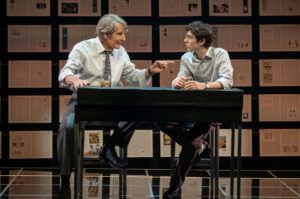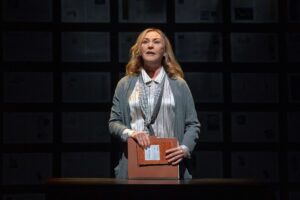ON THE TOWN WITH CHIP DEFFAA: AT “THE CONNECTOR”
What a terrific, beautifully layered performance Ben Levi Ross gives in “The Connector”—a moving, original new musical from Jason Robert Brown, Jonathan Marc Sherman and Daisy Prince.
By Chip Deffaa
[avatar user=”Chip DeFFaa” size=”96″ align=”left”] Chip DeFFaa, Editor-at-Large[/avatar]

Scott Bakula and Ben Levi Ross in a scene from MCC Theater’s production of “The Connector” (Photo credit: Joan Marcus)
Even after a lifetime of theater-going, I continue to be impressed by the power to affect me that good theater can have. And by the fact that good theater can be found in all sorts of places, sometimes out-of-the-way places.
Health problems prevented me from getting to see “The Connector” when it first opened in February. But I’m very glad I was able to catch it, late in its limited-engagement run (through March 17th 2024) at the not-for-profit MCC Theater, on 52nd Street between 10th and 11th Avenues. I was caught up in this musical from the very first notes of the Jason Robert Brown score. “The Connector” held me throughout. And it moved me. It’s a good, originalmusical (not an adaptation of a film, play, or book); good original musicals are getting to be rather rare.
I hope “The Connector” may transfer to another theater. It certainly deserves to have a future life. From time to time over the years, I’ve seen some plays (such as “Wit,” “Reasons to be Happy,” and “Hand to God”) receive their New York premieres at the MCC Theater, and subsequently go on to have commercial theatrical productions in larger theaters, in New York, and many other cities in the US and abroad. (And “Wit” was successfully turned into a cable-television film; I have it on VHS.)
I like the tone of “The Connector” (conceived and directed by Daisy Prince, who also directed the original productions of Brown’s shows “The Last Five Years” and “Songs for a New World”). I like the texture. It’s got an appealingly “meaty” feel; the story is told well through both the songs and the book scenes. (The book is by Jonathan Marc Sherman, and I’m impressed. He’s written plays before, and he also acts; but this is the first time he’s written the book for a musical, and it’s a well-crafted, nicely nuanced book; it has substance. I like what he’s done here a lot. Good book writers are in short supply.) And I’m glad that Concord Theatricals has recorded an original cast album of “The Connector,” which they plan to release this spring. I’m looking forward to it. I like Jason Robert Brown’s music; I look forward to getting to know the songs better.
The cast, for the most part, is excellent. (The Telsey Office/Patrick Goodwin, CSA have put together an unusually strong cast.)
What a terrific, beautifully layered performance Ben Levi Ross gives as “Ethan Dobson,” an ambitious, aspiring journalist, fresh out of Princeton.
I’ve only seen Ross once before. He had a small role in the film version of Jonathan Larson’s “tick… tick… BOOM!” (as did Jonathan Marc Sherman, for that matter); and I liked that film a lot. But here, he really gets to show what he’s capable of. And he gives a brilliant performance. I couldn’t imagine a better or more believable “Ethan Dobson.” The character was just so real. (I almost feel like: “Didn’t I go to college with that fellow?”) We come to know the character well. And we like him, we care about him, even as he’s making choices that we know are going to end tragically for him and for others around him. And when he phones his brother, desperate for some kind of lifeline, acknowledging that he’s messed things up, badly, we can’t help but feel what he’s going through. It’s a first-rate performance. And I will remember it.

Jessica Molaskey in a scene from MCC Theater’s production of “The Connector” (Photo credit: Joan Marcus)
And there are lots of good performances here. Scott Bakula (perhaps best known for starring amiably, for five years, in the original television version of “Quantum Leap”) is well cast as Conrad O’Brien, the aging editor of a prominent magazine, “The Connector.” And I love the way Prince has staged one of the best scenes in the show—the musical number “The Voice of My Generation.” She has Ross mirroring Bakula’s movements, which is a wonderful choice—it captures both the way Bakula’s character sees in Ross’s character a younger version of himself, and the way Ross’s character covets the kind of success that Bakula’s character has achieved. Their bonding is utterly true-to-life. They both, at that point, can imagine only a bright future.
And smaller roles, for the most part, have been cast very well, too. I welcomed seeing Jessica Molaskey, Daniel Jenkins, Eliseo Roman on stage.
And making the most of their moments in the spotlight were Michael Winther, adroitly affecting the cultured cadences of a public-broadcasting interviewer, and Mylinda Hull—sheer perfection as the unfortunate Mona Bland, who may seem like a nobody but will wind up changing lives. (Director Daisy Prince has done a good job of working in lighter moments, comic moments, in an essentially tragic drama.)
The only weak link in the cast I saw was Ashley Perez Flanagan. She has an important role but she’s not finding all that can be found in her character. She’s playing it too much on one emotional level. We feel her anger, her petulance as she says things along the lines of “You’re mean!” and “Life is unfair to me!” But ideally, we need to feel a subtler mix of emotions—that’s she’s not just angry, but hurt; that she resents Ethan, whom she sees as privileged, self-entitled and insensitive, but a part of her has also liked him, has maybe felt some attraction to him. Flanagan is skimming the surfaces of her lines. She pouts. She calls Ethan a bully. But we’re not really feeling all ofher ambivalence. And her character doesn’t quite feel authentic; it feels more we’re watching someone acting.
* * *
I found the play powerful. Is there room for improvement? Sure. Almost any production can be made better. The writing is taut. It’s insightful. But I could see the ending coming sooner than would be ideal. There’s lot of foreshadowing, perhaps even too much.
The ending would have greater impact if a way could be found to keep us in suspense longer–keep us wondering whether Ethan is really the hot-shot journalist his boss thinks he is or whether he’s a fraud, making up stories rather than reporting them. Because once we know how the show is going to end, it needs to end soon. And some cutting and/or rewriting would probably yield a harder-hitting ending. (By the way, Beowulf Boritt’s scenic design is superb; and the way the set is used for the final moment of the show is outstanding; I can’t be more specific without spoiling a surprise for some theater-goers.)
My other criticism of this production concerns the sound design. At some moments, the band felt too loud for the singers, and some lyrics got lost. I couldn’t make out most of the lyrics on the next-to-last song, “The Western Wall.” (Neither could the people sitting near me, as we talked after the show.) I’m not faulting the musicians or the singers; I just wish that whoever was in the sound booth, deciding how much to amplify the band, and how to mix the sounds, could have prioritized lyrical clarity. In a rock concert presented in some huge arena, the band can be cranked up really high and if audience members don’t understand every lyric, no one cares so long as the overall energy is high. But in musical theater—especially with a score by someone as gifted as Jason Robert Brown—you want to hear every word clearly. And you want the voices to sound as natural as possible.
“The Connector” is in a very intimate theater—just 243 seats—and I was sitting in the front row. Actors were singing just a few feet from me. I should have had no problem hearing all of the lyrics throughout the night. And, generally speaking, you really don’t need much amplification in so intimate a space.
I should stress, I heard most of the show’s lyrics just fine. When, for example, Jessica Molaskey—playing the only grownup at the magazine—sang her solo number, with simple, stark accompaniment, it was easy to understand every well-articulated word. But when all 13 cast members, plus six musicians, were giving us “The Western Wall,” a lot of the lyrics got lost. I hated needlessly missing even some of the lyrics. I like Brown’s work. (And he was leading the band and playing piano; he arranged and orchestrated the music, besides composing it; I like all of that.)
I’ve seen other Jason Robert Brown musicals in much bigger theaters, with bigger casts and bigger bands, but every word came through with crystal clarity in those productions; that’s what we expect when we go to the theater. I’ve never complained about sound design at any of Brown’s other shows. But I’m going to have to wait for the cast album to catch all of the lyrics to “The Western Wall.”
My last complaint is the absence of a proper Playbill or printed program at the theater. Patrons are advised to go online if they’d like to read bios of the cast members and the creative team. But artists of this stature deserve to have proper printed programs that patrons can comfortably read before the show starts, and can save as keepsakes, if they wish. I’ve saved every program for every show I’ve ever seen, since I was a kid enjoying “My Fair Lady” in its original Broadway run. I enjoyed “The Connector” more than any musical I’ve seen in a good while. I would have really liked having a proper printed program, with bios of everyone.
This production runs through March 17th. Get a ticket, if you can.
— CHIP DEFFAA






Leave a comment